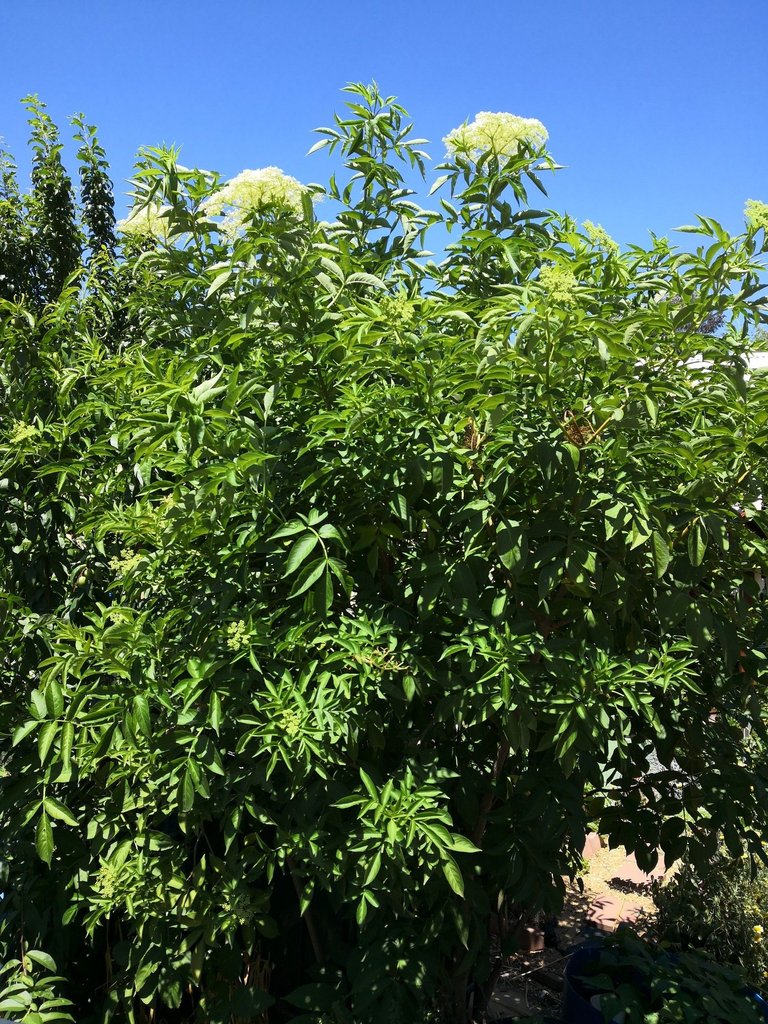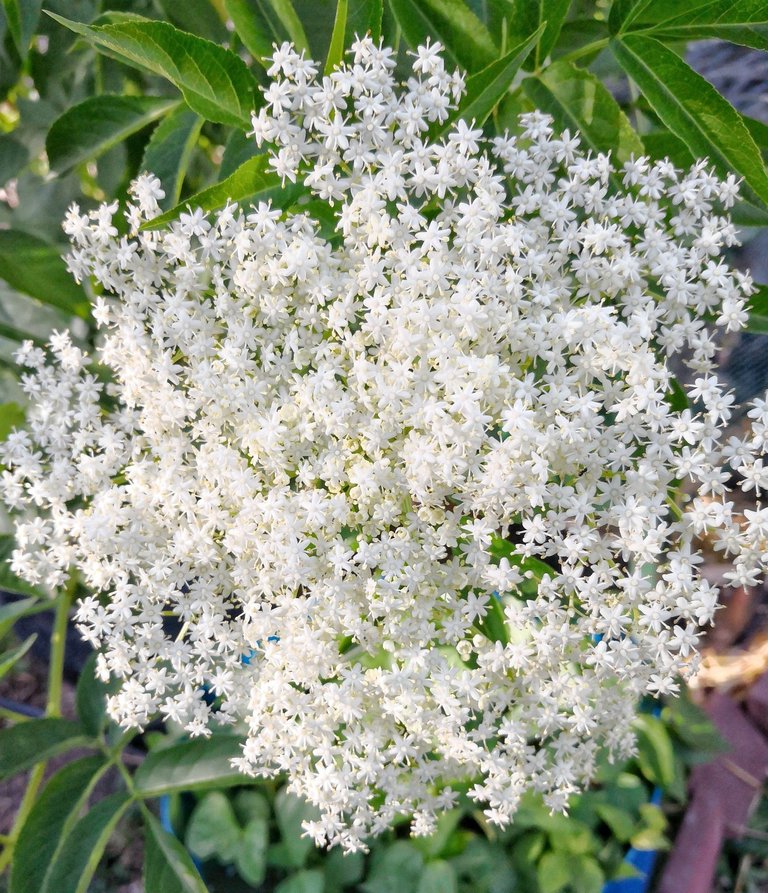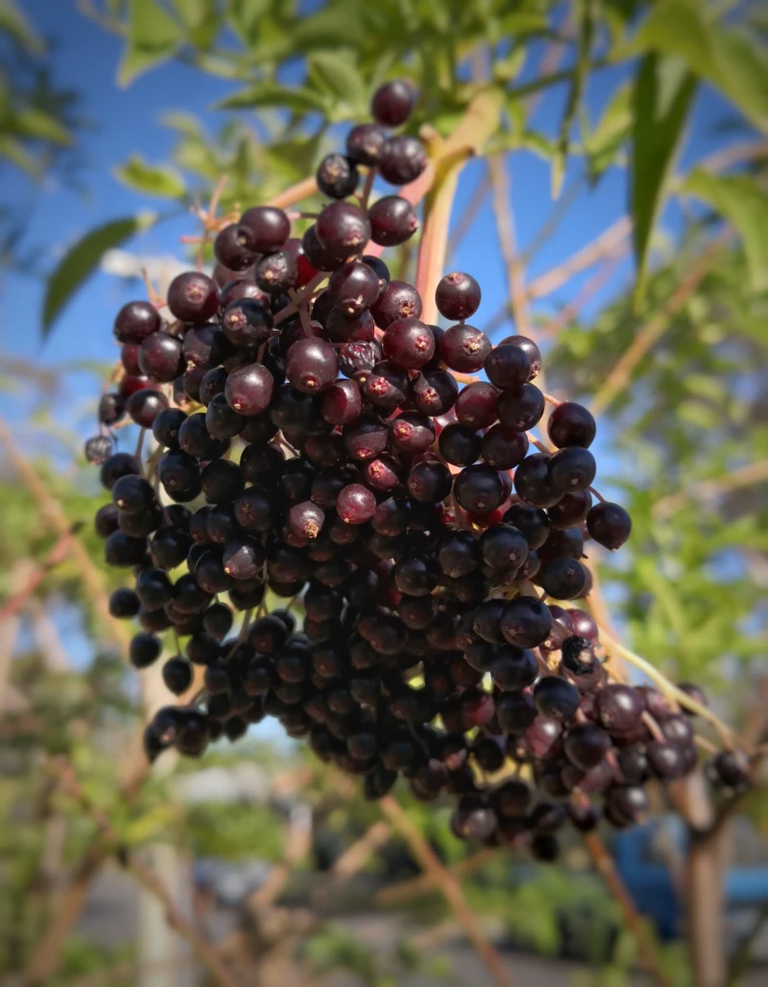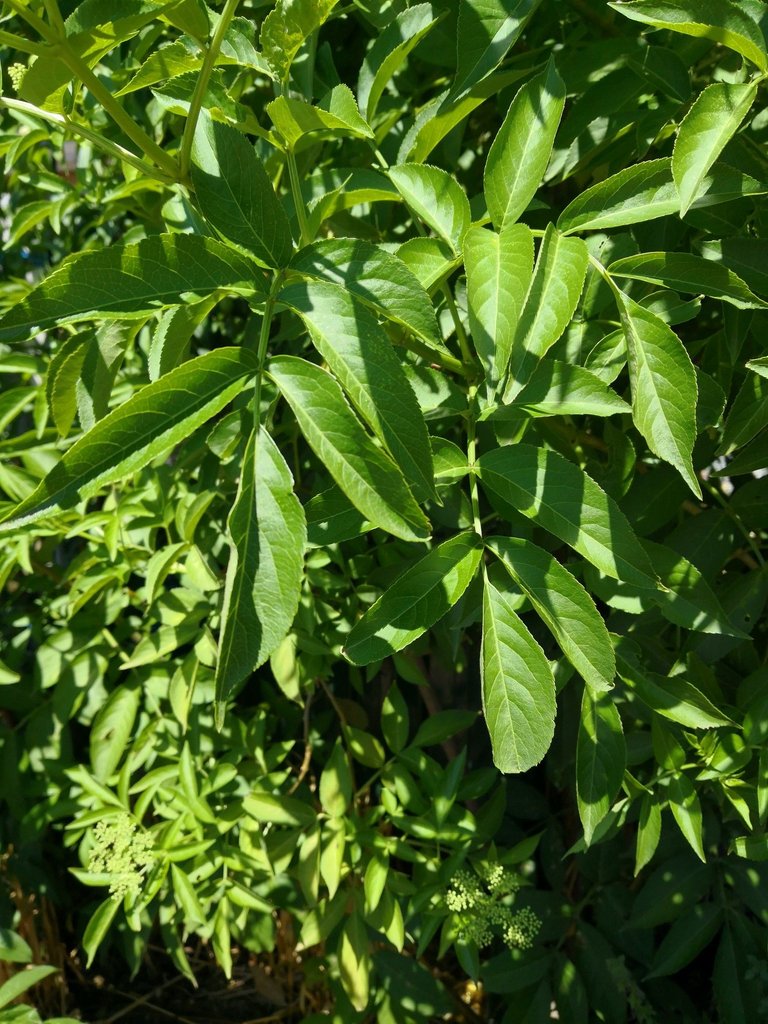
Common names: Elder, Elder Tree, Elderberry, Black Elder, Jie Gu Mu (TCM)
Taxonomic name: Sambucus nigra and S. canadiensis
Family: Adoxaceae
Related herbs: Cramp Bark and other Viburnums, Honeysuckle
Area of origin: Europe
Parts used: flowers, berries, leaves, bark, root
Can be used for: Colds, minor wounds, constipation, skin complaints, many viruses and infections, joint pain, urinary infections
Organ/System affinities: Kidney, Bladder, Lungs, immune system
Healing Actions: antimicrobial, diuretic, diaphoretic, laxative
Taste: Flowers – pungent, sweet berries- sweet
Tissue states: wind/heat, hot, moist/stagnant
Energetics: cooling, drying, dispersing
Healing constituents: volatile oil, antivirin, tannins, potassium, phosphorus, mucilage, phenols, triterpenes, lectins, flavonoids (rutin, isoquercitrin), sterols, anthocyanins, folic acid, vitamins A & C, calcium and essential fatty acids , beta-carotene and quercetin, Viburnic acid
Warnings: While the flowers are safe, parts of an Elder tree contain cyanogenic glycosides which can break down to release cyanide. This is especially true of the bark. The bark, unripe berries and seeds contain also small amounts of substances known as lectins, which can cause stomach problems you eat too much. Elder trees are extremely useful but should be used medicinally with caution.
Medicinal uses for Elder
There was a saying in old England that said ‘if a village has an Elder tree nearby, nobody needs to get sick’. That’s a fairly big ask for a tree, but when you look at the range of ailments Elder can help resolve, it’s quite believable.
Elder trees have a long history in folklore, being symbols of regeneration because of the ease of striking cuttings and their tolerance of a wide range of conditions. These associations go back to Greek, Roman, Britons and Celts and most European countries have some story about them. It is even said that if you sleep under an Elder tree, you can see that fairy realm (maybe that’s why our rabbits were so happy).
‘if a village has an Elder tree nearby, nobody needs to get sick’
We chose to place our Elder right smack in the middle of our garden because of its legion of folkloric and healing properties and also because they have a reputation of being a ‘nursery tree’ that means that anything grown near them will grow better. Our Sicilian Nectarine seems to think this is true!
Elder trees grow easily from cuttings – when ours came from a friend, it was just a branch which we simply stuck it in the ground over Winter and were rewarded with new leaves in Spring.
Elder is such a useful plant with so much folklore and medicinal research associated with it that Mrs M. Grieve has dedicated more than 10 pages (depending on the edition) to it in her encyclopedic ‘A Modern Herbal’. Every part of the Elder has been used, over time, for a galaxy of medical complaints. Each part has both unique and common properties, so I’ll divide the tree up into flowers, berries, bark and roots, though the latter have fallen out of fashion.
Generally, though, I like to think of ELder Flowers as being cooling and moving, Elderberries as being nutritive, preventative and supportive, leaves as soothing externally while the bark is for purging. If you keep those lose groups of attributes in mind while you’re reading the rest, you’ll be always in the ballpark. Some of the old herbals use the seeds for various purposes but I’ve not had experience with them outside of the berries.

Elder flowers
Elderflower is very good at clearing, what is called in TCM, ‘wind-heat’. Wind in that modality doesn’t always refer to the bellyache and sometimes humorous kind of wind, rather it refers to aches, spasm and cramps and symptoms that seem to move around, as if blown about by the wind. Shooting nerve and muscle pain are great examples of problems caused by wind. Allergies and sore, red, itchy eyes are a characteristic cluster of symptoms that show wind-heat clearly.
Combined with heat, it can refer to joint pain of the inflammatory types as well as many bronchial troubles. If you combine wind and heat, you also get many of the common symptoms of some kinds of cold or flu – shivering, aches, fever and the like. Herbs that clear heat and wind often do it by working as diaphoretic – they open the pores and move fluid and heat to the skin where they can be sweated out. A good fever and sweat are signs that your body is dealing with the problem as it should but sometimes these things get blocked inside and that can cause other problems/ Elderflower breaks the fever and sweat for you.
When fluids build up and don’t get expelled, especially when there is heat in the system, they thicken and turn to phlegm. Elder is great at clearing phlegm, whatever colour or viscosity it may be.
It is the basis for most of my cold and flu remedies. A cup of hot Elderflower tea will make you sweat and help to rid you of a sore throat or cold if you take it when you first see the signs that one is plaguing you. In this sense, its like Yarrow, a ‘diaphoretic’. It will force a sweat and help break the cycle of the cold. As with many herbs, Elderflower works as a diaphoretic when drunk hot but a diuretic if drunk cold. Either way, it is moving fluid out of the body. My favourite cold remedies are hot teas made from a combinations of of Elderflower, Yarrow, Mint, Catnip and honey or you can see this classic Yarrow, Elder Flower and Peppermint remedy – it only takes one or two cups of either of those to see me right when I have a cold.
Lucy Jones recommends Elderflower to be mixed with Nettles and Plantain and drunk as a tea in the lead up to hay fever season. It makes sense – Elderflower for the catarrhal build up, Nettles with their inbuilt antihistamine and Plantain to tone and tighten the nasal mucus membranes.
Elder flowers are an anti-inflammatory too and also contain a natural refrigerant that will help reduce fevers.
Elder flowers also have an affinity for the skin too. Elder flower ointment is wonderful for skin injuries such as cuts and burns. An ointment is good for dry, chapped skin and nicely combines with other softening herbs such as Rose, or Peachleaf.
In TCM, Elderflower is also used for some cases of epilepsy, which are caused, in that modality, by wind. Some migraines and tension headaches too fall under this rubric.
Elderberries

Elderberries, fresh, dried or juiced bring an antimicrobial and antiviral aspect to the benefits of Elderflower. The purple colour comes from anthocyanins, – potent antioxidants (generally, the redder or darker the berry or flowerm, the more of these they contain). They are useful in colds and flu because they have an good level of vitamins A and C and Viburnic acid, which has seen application as a decongestant. They also have an antiviral action. I find them more useful as a preventative but they have applications for acute ailments too.
Elderberries contain a compound called antivirin which stops viruses from attaching to human cells – a useful thing at flu time but also the reason why they have been successfully used for HIV, Epstein-Barr virus, HPV, Herpes, all of the -poxes and even Covid-19 . They are best used as a preventative but regular use will also stop the viruses from spreading in our system.
Because of their anti inflammatory and antibacterial properties, plus the vitamins and antioxidants in them, the berries are considered cooling. The berries are a mild laxative too, so use them in cases of mild constipation. If you need stronger treatment, read on.
Elder tree leaves

Elder leaves are used externally for minor wounds. Their anti-inflammatory and anti-microbial actions, plus tannins to stop the bleeding make the leaves almost a first aid kit in themselves.
The leaves have been used for centuries to make a traditional healing ointment called, appropriately “Green Elder Ointment’ or Unguentum Sambuci Viride. The traditional remedy incorporated such things as lard and suet but for more contemporary use, just make a salve or a balm. It is great for chapped skin, chilblains and soothing rashes. It is also useful fro bruising and sore muscles.
Elder tree bark
As mentioned earlier on this page, every part of an Elder tree has a use and those uses vary considerably between parts. I only include the bark here to emphasize that point. Elder barc contains Sambucine, which is a purgative.
Fresh Elder bark is toxic. It contains cyanide compounds.
The inner bark of the Elder tree needs to be aged for at least a year so that the toxic cyanide compounds break down to a reasonably safe level. Once this is done, it is a powerful ‘cathartic’. That means it will clean out your bowels strongly and quickly. Don’t take aged Elder bark unless you are near to a toilet or a bush or somewhere to hide when the inevitable results hit you.
Elder tree roots
Elder tree roots were used as a laxative and to ‘purge’ the patient (victim?). Their use is obsolete and one can get the same effects from aged bark.
How to get your own Elder Tree for free
Propagating Elder Trees from cuttings is so easy. Check out this post if you’re interested in growing one at your place.
Preparing and using Elder
Being so versatile medicinally, Elder can be prepared in any way that I can think of. Of course, different parts benefit from different preparation but you get the idea.
A hot Elderflower tea is many people’s first line of defense or remedy for colds and flu. Because they are gentle in action, they can be combined with many other herbs easily. Check this post for a pleasant combination. Drink often throughout the day, especially if you have a old where the fever and sweat hasn’t started yet.
Elderberries as a tea or infusion are part of my winter preventative routine which actually doesn’t prevent anything but helps my body rip through the symptoms in a couple of days as opposed to the usual week.
The berries make a nice, protective addition to to my heart protector glycerite. Their antiviral and nutrient content help to prevent the opportunistic health issues that come when we’re heartbroken or shocked.
The berries tincture well too, in reasonably low levels of alcohol. Many of the goodies contained within the berries are water soluble and don’t need a high percentage of alcohol to extract them. Elderberry syrup and wine are two very old, traditional uses that have stood the test of time.
Make a salve or balm with the fresh green leaves for many skin complaints. You can make the original Green Elder Ointment if you want to use suet and lard. Yuck! My last post was all about this, so check it out!
The inner bark, after it has dried for a year or so, can be powdered and taken in capsule form to purge your lower bits. It is very effective in this way, so watch out!
Some of you may have seen that I've been writing a series of posts about herbs and making herbal remedies at home. I want to share what I know of this topic so that, as the world gets crazier, folks will have other avenues of medical care, namely those of themselves and their community. If you look back over this blog, you can see heaps of info on the topic, plus loads and loads of posts on herbs and using Australian bushfoods from a white perspective. If you haven't been around on in the @hivegarden and @naturalmedicine communities for long, you may be interested in looking back. There's w-a-a-a-a-y too much there for me to repost and the Hive system doesn't let you vote on old posts so, if you're happy with what you find, I believe that there is now a tip option...





👏 Keep Up the good work on Hive ♦️ 👏
sagarkothari88 to upvote your post ❤️
❤️ @jasonmunapasee suggested
Thank you both!
The birds got all the berries again this year. Maybe next year I will manage to get some…
Ow. Birds so love them though we usually get a enough to make some medicine from. I maybe we can net ours this year if I keep it under control
We support gardening, homesteading, cannabis growers, permaculture and other garden related content. Delegations to the curation account, @gardenhive, are welcome! Keep an eye out for our weekly writing prompts and our monthly #gardenjournal challenge on the 1st of each month.